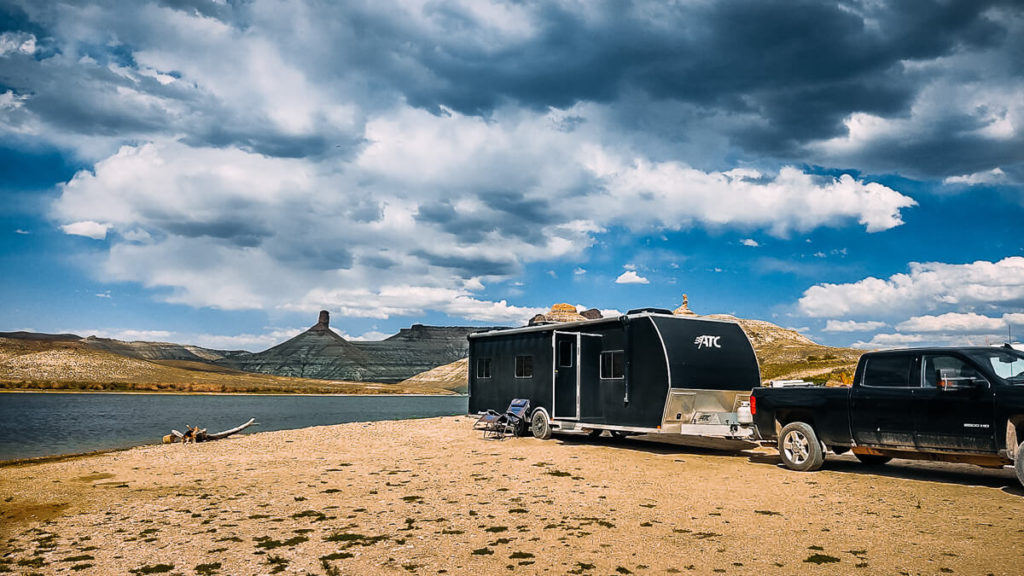The difference between dry camping and boondocking is that dry camping is a general term for any kind of vehicle camping without hookups, while boondocking is a more specific type of dry camping. Where dry camping can occur anywhere in town or deep in the wilderness, boondocking is always away from town.

What is the Difference Between Dry Camping and Boondocking?
Dry camping is a general term used to describe any kind of vehicle-based camping where there are no utilities to hook up to. It can include camping within a heavily populated downtown area, or a remote part of a wilderness.
Boondocking is specific type of dry camping, located far away from populated areas. It is usually associated with camping in nature, like in remote parts of the desert, forest, or grassland. The term “dispersed camping” is synonymous with boondocking. People often use the term with camping in any kind of natural habitat regardless of how close or how far from civilization.
Origin of the Word Boondocking
The word “boondocking” stems from the word, “boondocks”, which originates from the Tagalog word, “bundók” which means “mountain”. The word was brought to the United States by American soldiers fighting the Philippine-American War (1899-1902). The Filipino people used the word as a colloquial for rural inland areas, which on the Philippine islands is generally mountainous, difficult to reach areas.
The phrase, “out in the boonies” stems from “boondocks”.
Learn more about this at, “What Does Boondocking Mean?“
Dry Camping Encompasses a Wide Genre of Camping Styles
Dry camping includes all of the following variations of camping…
- Boondocking – a general term for camping far from populated areas, with no hookups, and away from developed campgrounds and designated sites. It almost always involves using a vehicle, though it could certainly encompass hikers with tents.
- Primitive Camping – generally refers to camping without hookups of any kind. It can involve camping in dense, urban areas, or deep in the wilderness. It can include camping in campgrounds and RV parks, as long as there are no hookups.
- Backcountry Camping – this refers to camping deep within a park, refuge, or forest, far from developed areas. It’s most often used with national parks and state parks to describe the more remote areas with little to no roads. It’s typically associated with hikers who tent camp, but it has often been used to encompass vehicle-based camping along rough, rugged roads. It’s very similar to boondocking.
- Dispersed Camping – refers to camping outside developed campgrounds, RV parks, or other developed areas. This is the term most closely associated with boondocking, and its usually the official term that federal and state agencies use instead. It literally means camping in area where are you are free to set up camp anywhere you want. However, it usually means camping on a clearing along the side of a road.
- Free Camping – refers to camping where you don’t have to pay. It can be located in dense urban areas, or in out in the wilderness away from people. It can also include camping with hookups as long as there are no fees.
- Wild Camping – this is effectively the same as dispersed camping and boondocking. It’s a term rarely used, but you may still see it from time to time.
- Moochdocking – this is camping on private property not owned by you. This is what Boondockers Welcome and Harvest Hosts is. The name “Boondockers Welcome” is misleading because it is not boondocking at all; it is overnighting in populated areas.
- Wallydocking – this is specifically using the parking lot of a Walmart for sleeping overnight. It is not camping at all because there is no recreational element; it is just spending the night in between campsites.
- Overlanding – this type of camping involves a vehicle where you leave the road and travel across terrain, and then set up camp. It’s a more specific type of boondocking. Where boondocking generally means a vehicle that finds a clearing off of a road, overlanding completely leaves the road altogether. Most overlanding enthusiasts, however, do not completely leave the road, because it’s almost always illegal to do so.
- Glamping – is any kind of camping where you are more interested in publicizing your outing on social media for purposes of making your friends envious. Usually it involves camping in areas far from town, without hookups, but where lifestyle and character are emphasized.
More Discussion About Boondocking
For more discussion about what boondocking means, read our other article, “What is Boondocking in an RV?“

